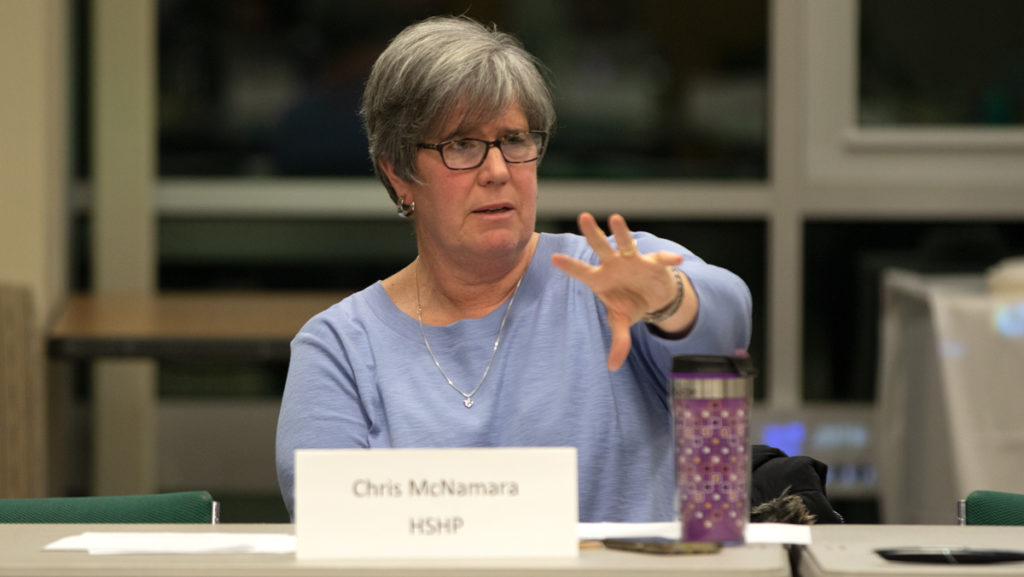At the Ithaca College Faculty Council meeting on Jan. 21, David Gondek, associate professor in the Department of Biology, presented revisions to the Integrative Core Curriculum (ICC), which will be completed and presented to the relevant committees by December.
Gondek presented four proposals. He said the Ithaca Seminar will not be changed and will remain a four–credit class. The complementary liberal arts requirements will be removed from ICC as part of the assessment, Gondek said. Certain majors will also be able to waive a perspective if approved by the department housing the major. For example, Gondek said the biology department could waive the natural science perspective for biology majors.
Under the current ICC structure, students are required to take one class each in the creative arts, humanities, natural sciences and social sciences perspectives. The Class of 2025 will be the first class that will not be assessed using the ePortfolio, Gondek said. All prior classes will be required to finish out their requirements on the ICC ePortfolio.
Also during the meeting, the Faculty Council returned to an earlier discussion of employee and student relationships. Guilherme Costa, vice president of legal affairs, originally met with the Student Governance Council to propose a new policy prohibiting intimate relationships between all faculty and staff members and students. The Faculty Council previously spoke about the policy in an executive session during its Dec. 3 meeting.
At the Jan. 21 meeting, Costa said the biggest updates to the policy draft that the council saw in December was an addition of a web form to disclose employee–student relationships. Claire Gleitman, professor in the Department of English, said the web form would be helpful, but some disclosures may warrant a face-to-face discussion. Costa said he would add the option of going to the Office of Human Resources for a disclosure.
The policy is still in the draft process but is nearing completion, Costa said. He said the discussion will then shift to addressing challenges in implementing the policy. It is unlikely that the policy will be enacted before this summer, but the best time to implement the policy would be during the summer when fewer classes are in session, Costa said. However, he said he does not yet know when the policy will be put in place.
The Faculty Council also revisited a 2015 policy regarding scheduling single-section classes between 4 and 6 p.m. Chris McNamara, Faculty Council chair and clinical associate professor and clinic director in the Department of Physical Therapy, said the Faculty Council created a policy in 2015 stating that a single–section class required for a major cannot be taught between 4 and 6 p.m. on weekdays unless the respective dean approves an exception. McNamara said that because there was a reasonable number of members who were not in favor of the policy, the council decided to revisit the policy two years after its original approval.
During the original discussion of the policy, McNamara said that Susan Bassett, associate vice president and director of intercollegiate athletics and recreational sports, and an NCAA representative spoke to the council. McNamara said they discussed that it was not fair to students who wanted to pursue athletics and excel in their major classes to have single-section, major–required classes scheduled between 4 and 6 p.m., a time that sports teams would usually have athletic practices.
Stanley Seltzer, associate professor in the Department of Mathematics, asked for data regarding the number of exceptions to this rule and if students had encountered problems with the exceptions. McNamara said she only knew of incidental complaints. Jason Harrington, associate professor in the Department of Media Arts, Sciences and Studies, said the policy is often violated.
McNamara said the discussion should be passed on to the Deans/Chairs Committee because the council needs more data, like the number of exceptions and if the policy has improved the availability of major classes for student–athletes.
The Faculty Council also voted to approve an academic policy stating that freshman students will be referred to as first-year students in an attempt to use more inclusive language.








